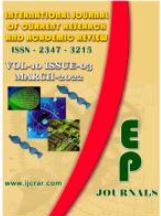Abstract Volume:10 Issue-3 Year-2022 Original Research Articles
 |
Online ISSN : 2347 - 3215 Issues : 12 per year Publisher : Excellent Publishers Email : editorijcret@gmail.com |
The genetic purity in the commercial seed production is maintained through a system of seed certification. Seed certification implies that the crop and seed lot have been duly inspected and that they meet requirement of good quality pedigree seeds. To achieve this purpose, qualified and well-trained personnel of seed certification agencies carry out field inspection at appropriate stages of crop growth. They also make seed inspections to verify that the seed lot is of the requisite genetic purity and quality. In addition to inspections, seed certification agencies also lay down the field and seed standards which the seed crop and seed lot respectively must conform to get approval as certified seed. The field standards include land requirements, isolation requirements, maximum permissible off-types etc. Thus, seed certification programs, along with foundation seeds tock programs, provide a vital link between plant breeders who develop public (and some private) crop varieties and farmers or other users who plant them.
How to cite this article:
Zeleke Keimeso. 2022. Review Article: Principles and Practices of Certified Seed Production.Int.J.Curr.Res.Aca.Rev. 10(3): 112-121doi: https://doi.org/10.20546/ijcrar.2022.1003.012



Quick Navigation
- Print Article
- Full Text PDF
- How to Cite this Article
- on Google
- on Google Scholor
- Citation Alert By Google Scholar
